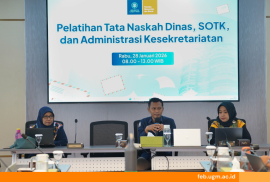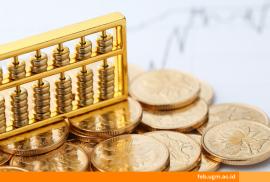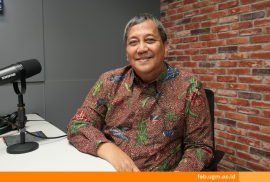The 8th Gadjah Mada International Conference on Islamic (GAMAICI) is a series of international conference events organized by Center for Sharia Economics and Business Studies (PKEBS) of the Faculty of Economics and Business, Universitas Gadjah Mada (FEB UGM) in the context of disseminating research and exploring topics and issues surrounding Islamic economics and business. GAMAICI consists of GAMAICI- Economics and Development (GAMAICIED), GAMAICI- Accounting and Finance (GAMAICIAF) and GAMAICI- Business Research (GAMAICIBR). The 8th GAMAICI has the theme “Sustainable Development through Islamic Finance: Opportunities and Challenges in Accounting, Business, and Economics’. This activity is in line with the Sustainable Development Goals (SDGs) Goal 1: No Poverty and Goal 9: Infrastructure, Industry and Innovation.
The opening of the 8th GAMAICI was held on Sunday (29/9) at the Learning Center Building, 8th floor of FEB UGM. The opening of this conference began with remarks by Ahmad Zaki, S.E. M.Acc, Chair of the Committee of GAMAICI, followed by remarks from Gumilang Aryo Sahadewo, S.E., M.A., Ph.D., Vice Dean for Research, Community Service, Cooperation and Alumni. Then, the conference continued into the main session, namely a seminar moderated by M Akbar FA, S.E., M.Sc, Lecturer at the Accounting Department, FEB UGM. The first speaker in this seminar was Prof. Habib Ahmed, Professor & Sharjah Chair in Islamic Law & Finance at Durham University, regarding “Islamic Finance and Sustainability: Synergies and Innovation”. Prof. Habib explained that the world, initiated by the United Nations (UN), has agreed to strive to achieve sustainable development goals (SDGs) by 2030, consisting of 17 goals.
Prof. Habib then explained that the SDGs are strongly correlated and in line with the five maqasid al sharia in Islam (religion, life, intelligence, heredity and wealth), which include improving the welfare of society and the planet. In addition, in Islamic economics, Islamic economic values are principles in sharia financial practices, which also contribute to the SDGs. Prof. Habib then detailed research by The General Council for Islamic Banks and Financial (CIBAFI) regarding the global sharia industry, opportunities and challenges, as well as innovations needed in building a global sharia financial industry, for example, with halal and thayib principles. Sharia finance also has great potential as an enabler of innovation among Muslim communities around the world, said Prof. Habib.
The seminar session was continued by Dr. Imam Teguh Saptono, Deputy Head I of the Executive Board of the Indonesian Waqf Board, entitled “Enhancing Waqf Sustainability: Innovative Approaches, Strategies, Future Trends, and Prospects”. In his presentation, Dr. Imam explained that he covered economic development, sharia finance, and the role of Waqf. Dr. Imam started with challenges in the global economy, including geopolitical tensions, climate change, digitalization and pandemics. Then, Dr. Imam explained that the global economic system gives rise to global frustration, namely socio-economic disparities and poverty rates that are increasingly widening.
Addressing this, Dr Imam explained that the Islamic economic system, through the financial instrument Zakat Infaq Shadaqah Waqf (ZISWAF), is able to overcome gaps in global economic problems. In more detail, Waqf will play a role in building civil infrastructure, Zakat will play a role as an economic saviour from poverty, and Infaq and Sadaqah will play a role as an economic cushion. Dr. Imam explained further about the potential of Zakat in Ummah’s economy in both microeconomic and macroeconomic contexts. One of the sharia financial instruments that have significant economic potential is the cash waqf-linked Sukuk (CWLS) scheme. This instrument succeeded in winning the Global Innovation Award from IsDB 2023 and became a pioneer in the revival of Waqf in Indonesia. Dr. Imam concluded that ZISWAF, which is integrated with digital information system infrastructure, supported by the increasing Islamic philanthropy market, can bring Sharia economics into a solution to global economic problems, especially inequality and poverty. The opening of GAMAICI continued with questions and answers, which were enthusiastically participated in by the conference participants.
Reportage: Hayfaza Nayottama






